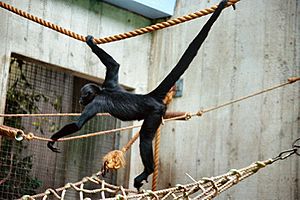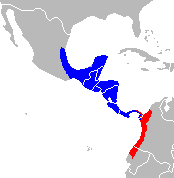Black-headed spider monkey facts for kids
Quick facts for kids Black-headed spider monkey |
|
|---|---|
 |
|
| Conservation status | |
| Scientific classification |
|
| Kingdom: | Animalia |
| Phylum: | Chordata |
| Class: | Mammalia |
| Order: | Primates |
| Suborder: | Haplorhini |
| Infraorder: | Simiiformes |
| Family: | Atelidae |
| Genus: | Ateles |
| Species: |
A. fusciceps
|
| Binomial name | |
| Ateles fusciceps Gray, 1866
|
|
 |
|
| Distribution of A. geoffroyi (blue) and A. fusciceps (red) | |
| Script error: The function "autoWithCaption" does not exist. | |
Script error: No such module "Check for conflicting parameters".
The black-headed spider monkey (Ateles fusciceps) is a type of New World monkey. These monkeys live in parts of Central and South America. You can find them in countries like Colombia, Ecuador, and Panama.
Some scientists think the black-headed spider monkey is its own species. Others believe it is a subspecies of the Geoffroy's spider monkey.
There are two main types, or subspecies, of the black-headed spider monkey:
- Ateles fusciceps fusciceps - This one lives in northwestern Ecuador.
- Ateles fusciceps rufiventris - This one lives from southwest Colombia to eastern Panama.
Contents
Where They Live
The A. f. fusciceps subspecies lives in warm, wet forests. These forests are found between 100 and 1,700 meters (about 330 to 5,580 feet) above sea level. In these areas, you might find about one or two monkeys per square kilometer.
The A. f. rufiventris subspecies lives in different kinds of forests. These include dry forests, humid forests, and cloud forests. They can live much higher up, from 2,000 to 2,500 meters (about 6,560 to 8,200 feet) above sea level.
What They Look Like
The A. f. fusciceps monkey usually has a black or brown body. Its head is typically brown. The A. f. rufiventris monkey is mostly black. It might have some white fur on its chin.
Black-headed spider monkeys are among the larger New World monkeys. Their body and head, not counting the tail, are usually between 39.3 and 53.8 centimeters (about 15.5 to 21.2 inches) long. Their special prehensile tail is even longer, from 71.0 to 85.5 centimeters (about 28.0 to 33.7 inches). This tail can grab things like another hand!
On average, male monkeys weigh about 8.89 kilograms (19.6 pounds). Females are very close in weight, at about 8.8 kilograms (19.4 pounds). Their brain weighs about 114.7 grams (4.05 ounces).
What They Eat
Black-headed spider monkeys mostly eat fruit. About 80% of their diet is made up of different fruits. They are also omnivores, meaning they eat other things too. This includes leaves, nuts, seeds, tree bark, insects, and flowers.
How They Behave
These monkeys spend most of their time in trees. They are also diurnal, which means they are active during the day. Black-headed spider monkeys are very social animals. They live in groups that can have up to 20 individuals. However, they often travel in smaller groups when moving around.
They move mostly by brachiating. This means they swing from branch to branch using their long arms. They are also good at climbing through the forest.
Family Life
When it's time to mate, a female might stay with one male for up to three days. Or, she might mate with several males. Mating happens with the male and female facing each other. It can last for about five to 10 minutes.
A baby monkey grows inside its mother for about 226 to 232 days. After birth, the infant rides on its mother's back for about 16 weeks. It stops drinking its mother's milk at around 20 months old.
Female monkeys become ready to have babies at about 51 months old. Males are ready at about 56 months old. Females usually give birth every three years.
The International Union for Conservation of Nature (IUCN) says the black-headed spider monkey is an endangered species. This is because their population has dropped by more than half over 45 years (from 2018 to 2063). This decline is due to hunting and people taking over their forest homes.
In zoos, black-headed spider monkeys have been known to live for more than 24 years.
Gallery
See also
 In Spanish: Mono araña bracilargo para niños
In Spanish: Mono araña bracilargo para niños
 | Jewel Prestage |
 | Ella Baker |
 | Fannie Lou Hamer |




